While we have been under a shelter-in-place order in the Bay Area, the ALS community has mostly been telecommuting. We caught up with Angelic Lucero, Karen Nunez, Ina Reichel, Bruce Rude, Ashley White, and Antoine Wojdyla to see how they have been handling this unprecedented experience.
Angelic Lucero, Accelerator and Floor Operations
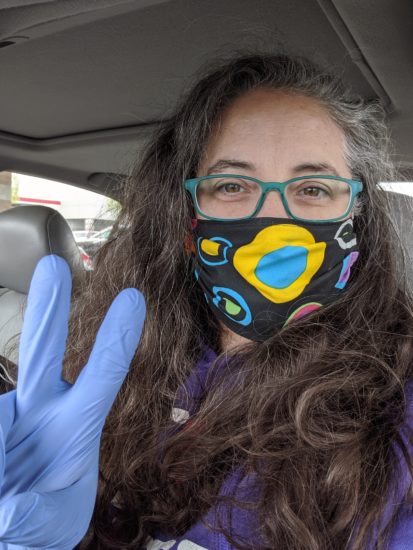
I live with three other adults who are all disabled and have COVID risk factors. My son lives locally and is a med tech at Carlton Senior Living in San Leandro, and my daughter lives here half time. I am really worried about keeping my mom’s exposure low, so I asked my son not to visit us, and I asked my daughter’s father to keep her at his house. So, I haven’t hugged my children in over a month, which I think is probably worse than being annoyed with them underfoot. It’s definitely harder as time goes on.
Last week, my mom was sick. At first, we thought she just had trouble sleeping because of back pain, but by noon, she was throwing up. At the Oakland Kaiser emergency room, I walked with her for 10 yards, and they told me nobody but the sick person was allowed in. Part of her problem was dehydration, and it’s startling how much effect hydration has on her mood, sleep, and everything. On the one hand, I’m worried about her and wish I could visit her, but on the other hand, I know she’s feeling better, and the doctors are doing everything they can for her. [Angelic’s mother is now home, feeling much better, and sewing masks for the community.]
I’ve been on site about once a week for the COVID operations, but otherwise, I’ve been working remotely. I find it’s almost impossible to work eight hours straight. I just have to work for two or three hours and then go do something for a little while, work a little more, and then take a break again before working some more. The first time I had a group meeting with floor operations was a week after shelter-in-place started. I was surprised by how great it felt to see my coworkers’ faces and how much that actually made a difference in how I felt.
Karen Nunez, Procedures Center
Getting started with work from home was somewhat bumpy because I didn’t have an area set up there to work. Also, my husband and 8-year-old son (who normally have homeschool) typically want my attention as soon as I arrive home, and each take time to catch me up on what happened in their day while I am away at work. Now that I don’t need to get caught up, and need my own space, we are all learning to develop new habits. Some days go well where I am left alone, and might get snacks brought to my door. Other days, I realize how very little it takes to break my concentration. I’ve come to realize I’m a lot more patient and nicer to my co-workers than I am to my own family where there are no HR rules. Maybe we need to make our own rules. In the end, locked doors and headphones also have helped, and so do promises of taking lunch and breaks during the day to visit them on the other side of our small house. This pandemic has forced me to spend more time with my husband and son to take part in their daily activities of learning, praying and playing. I’ve also made a new daily habit of telling my son that he’s my favorite co-worker when I hug him. He likes to resist me and run from me, at which point I try to catch him as I chase him down the hall. Like I told a friend, we’re all just doing the best we can as we try to figure things out.
Ina Reichel, Accelerator Technology & Applied Physics and ALS Communications
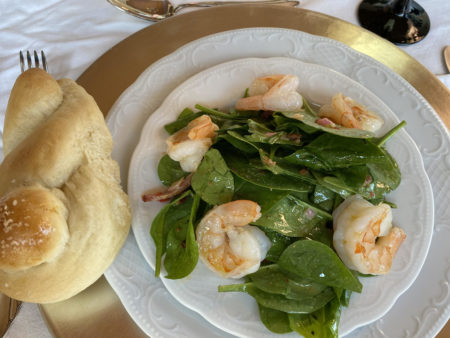
There are three adults in our household (my husband Christoph Steier, our 18-year-old son Alexander who is a high school senior, and me). When we all suddenly had to work from home, it took some figuring out who goes where. Although our home office has a large desk and would have room for both Christoph and me to work there, with lots of Zoom meetings that wouldn’t really work.
Last week was spring break for Alexander, and we had planned to visit some colleges. Instead, it is virtual campus tours and information webinars. There was some anxiety, as this semester he will not get letter grades (just pass/fail), and he is still taking two UC-required classes. Luckily, UC announced that for this semester, they will accept a pass.
We try to get some exercise. It helps that we have a treadmill, which both Christoph and I tend to use in the morning. Most days we go on a half-hour lunchtime walk through the neighborhood (if meeting schedule allows we go together) and then another one before I start cooking dinner.
I’m cooking more from scratch than I normally do. I like baking breads that I typically can’t make because they require several hours in between steps, so on a normal workday would be finished by midnight, but working from home I can quickly throw the ingredients together at lunch and we have fresh bread for dinner. And, of course I knit a lot, which I know from past experience helps my mental health.
Bruce Rude, Instrumentation
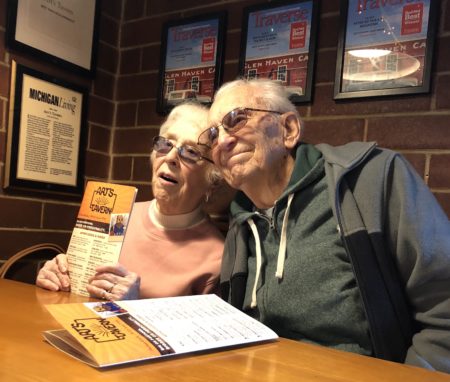
My immediate family is doing fine. My wife works at Oakland Kaiser in Occupational Medicine, so is not currently on the front lines. However, she was notified last week that she may be called, pending the stress levels on the front lines. Given her background and training, she would likely go straight to the ICU. This forces us to strategize how to organize the spaces at home and, given my increased exposure risk, how I would return to the Lab. My son is doing some graduate work at UC Davis in neurobiology and just texted that they will be doing some studies on immune system response to COVID-19 once they figure out how to do it with social distancing. So, I am without the stress of children being here, but I can definitely empathize with the situation some of my colleagues are in.
My 92-year-old mother lives at home in Michigan and has a good support system, but my 95-year-old father has dementia and is in an assisted living facility. Because family can’t visit for the time being, he panicked. Video surveillance showed him stacking a 5-gallon bucket on a patio chair, but he couldn’t climb over the fence. He then removed the screen from a window in the dining room and exited. The facility didn’t know for two hours, until the sheriff brought him back! My dad is fine; within hours, he was completely unaware he’d escaped! Of course, my family has spent hours on the phone with the facility and state investigators. Though my parents are fine for now, I realize hospitalization during these times means family can’t be there to help. Not only is the patient dying alone terrifying for the family, but it takes an enormous emotional toll on the healthcare workers. It reminds me that this is a health crisis first.
For me there has been a real upside to the shelter in place. One thing I’ve learned is that being alone in a quiet house, without relentless interruption, is a really good thing! I’m working through an enormous backlog of office work that dates back to my Beamline 6 days, and I’ve become acutely aware of the extent to which I let beamline “crises” organize my time. So, I’m working on a new plan for dealing with that, which includes using software and, since I am set up at home now, will include some days working from home.
Ashley White, ALS Communications
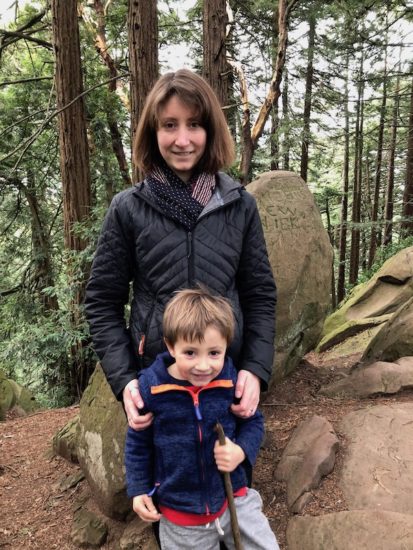
I’m sheltering in place with my husband, three-year-old son, Ben, and cat. Normally my husband and I would both be at work, and our son would be in preschool. Now, my husband and I switch back and forth between the world of Zoom meetings and emails and the world of sofa-cushion-and-blanket tents, daring firefighter rescues of stuffed animals “stuck” in our plum tree, and (dare I say) the occasional tantrum.
Each weekend, we sit down together with our calendars and map out, hour by hour, who will be stationed in our makeshift office working, and who will look after Ben. When we have conflicting meetings, we try to adjust our schedules or sometimes have to miss a meeting. It’s pretty impossible for either of us to work as many hours as we’re used to, so I think we’re both learning to be more efficient with and protective of our time.
I feel fortunate I’m in a role that allows for straightforward teleworking, but I do miss the hustle and bustle of the ALS and bumping into colleagues and users who will give a heads up about some exciting new work or just have a catch-up on personal life.
Antoine Wojdyla, Optics & Optical Systems and ALS-U
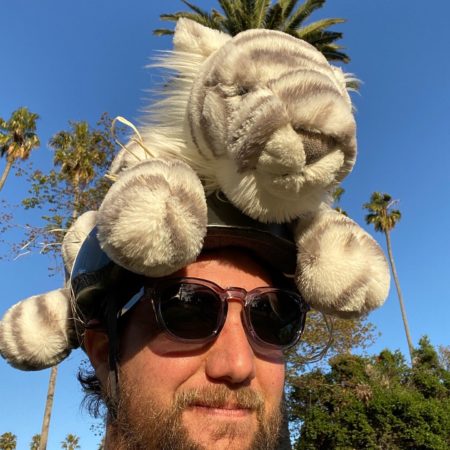
We have a competent and mindful management at the lab, and I am lucky with the ALS-U Project to be in a phase of design, where we can do most of the work from home. Still, I find it hard to focus on work, and talking with others helps me realize that it’s not only me. I try to divide my work in little chunks, and it’s been pretty amazing to be able to work with colleagues across the country, almost seamlessly. The compression of distances is compensated by a lot of time spent online, and there’s a mild Zoom fatigue coming in. To help with this, I try to go on a hike everyday around sunset—we have so many great outdoor spaces around (the Fire Trail, Tilden Park, Lake Anza, Huckleberry Preserve, the Berkeley Marina, and many others). There’s also a daily coffee with colleagues (hosted by Diane Bryant) that helps give a routine, and sometimes online meditation.
The current situation brings a lot of stress on many people, and it may seem strange because most of us are in a safe situation. I’ve been through a few disasters (I saw the islands where I grew up obliterated a few times by natural disasters), but people usually get back on their feet quickly, whereas this situation is different—with a looming threat and anxiety about the future. This is especially true for early career scientists with whom I converse frequently, who often don’t have the social fabric to cope with the situation, and are facing an uncertain future. Make sure you get in touch with the ones you know; they will appreciate it greatly. The feeling of helplessness when you’re not a medical worker can weigh on you, but there are ways to contribute (see Lab suggestions or Engineers and Scientists Acting Locally; donating a spare device to school kids in need or providing tutoring can go a long way). The world flickers, and we can seize the occasion to see things in a new light.